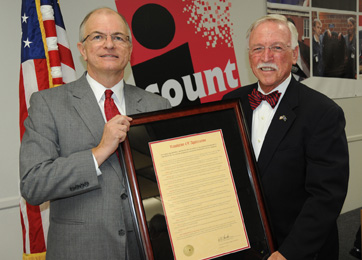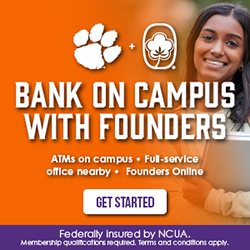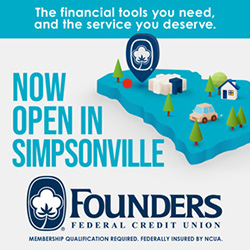Booth honored for 10 years of service to TCTC

At Tri-County Technical College’s Annual Report Luncheon, on behalf of the College’s Commission, Chairman Ham Hudson, right, presented Dr. Ronnie L. Booth with a proclamation of appreciation for his leadership and significant accomplishments on the occasion of his 10th anniversary as president of the college.
PENDLETON — When Dr. Ronnie L. Booth became Tri-County Technical College’s third president on July 1, 2003, he pledged his commitment to developing and maintaining partnerships, designing a roadmap for the College’s future, and reaffirming the College’s commitment to leaving a legacy of serving students and their communities.
His vision, from the beginning, was for Tri-County Technical College to become a role model for community college education through dedication to high standards, a nurturing environment, community alliances and innovative leadership.
At the Annual Report Luncheon Nov. 5, on behalf of the College’s Commission, Chairman Ham Hudson presented Dr. Booth with a proclamation of appreciation for his leadership and significant accomplishments on the occasion of his tenth anniversary as president of Tri-County Technical College.”
“Dr. Booth is a man of great integrity, high standards, and a commitment to excellence in everything he and his fine team of College professionals undertake,” said Mr. Hudson. “Those of you who know him well are probably familiar with a saying he has — ‘You can either curse the darkness or turn on the light. I prefer to turn on the light.’ Dr. Booth, your leadership is our light along every path we have taken over the last ten years, and I hope you will continue to be our light for many years to come.”
“I was completely caught off guard when the commissioners presented me with this resolution. The work the College has completed would not have been possible without the strong support I’ve received from a great board that truly values what we are trying to accomplish. The hard work of our faculty and staff are the reason we’ve been able to achieve so much over the past decade. I look forward to continuing our work by helping every student be successful, no matter what their future goals might be,” said Dr. Booth.
During his 10 years at Tri-County, Dr. Booth opened the College’s first three community campuses — the Anderson Campus located at 511 Michelin Boulevard, the Oconee Campus at the Hamilton Career Center in Seneca, and the Easley Campus on Powdersville Road in Easley. In addition the Anderson, Seneca and Easley campuses have opened QuickJobs Development Centers for workforce and industry training. In January, the College opened a state of the art Industrial Technology Center in Sandy Springs that houses the Welding and Heating, Ventilation, and Air Conditioning (HVAC) programs and was specifically designed to mimic a real-world industrial setting.
The community campuses, along with the Learning Center at the Watkins Community Center in Honea Path, serve several of the College’s goals by bringing its services closer to residents, increasing community involvement and expanding educational opportunities.
During his tenure, the College has grown in size and reputation, setting enrollment records with nearly 7,000 credit students, making Tri-County among the fastest-growing of the 16 technical colleges in the State.
Always thinking beyond the typical way of working together to develop new strategies for student success, in 2005 Dr. Booth launched a Connect to College program for high school dropouts and the first-in-the-State Bridge to Clemson program with Clemson University. The Bridge program is designed for recent high school graduates who narrowly missed admission to Clemson because of limited space and high demand. The program enrolled 700 students this fall — its largest class to date. In addition to the Bridge to Clemson program, the College has articulation agreements in place that allow graduates from several Tri-County career programs to be accepted with junior standing in specific majors at Clemson. Tri-County also has transfer agreements with Anderson University, Erskine College, Lander University, Limestone College, USC College of Engineering, and USC Upstate.
Our profile has increased and the community has a definite appreciation for the quality of education here,” said Dr. Booth. “Bridge to Clemson was a stamp of approval. It was significant. Two years at our College lays an incredible foundation for work or the next level of education.”
In one of the first speeches he gave when he assumed the presidency in 2003, Dr. Booth talked about his plans for moving the College towards fulfilling its mission, in terms of long-term accomplishments. There were three pathways to consider — maintenance, monuments, and movement. Instead of remaining static, or working on the infrastructure, Dr. Booth says he chose the latter. “Movement is purposeful and strategic. It’s about preparing students for success, meeting their needs, and positioning the College to meet future needs,” he said.
“I asked myself, ‘How do we get to where we need to be? What are the needs of the future, and how do we hitch up and remain relevant?’”
“My vision, from the beginning, was for Tri-County Technical College to be viewed as the role model in community college education — a model that others strive to emulate. Achieving such an ambitious vision takes time and work, but achieving it is definitely possible,” he said.
In 2010 Tri-County was among the 48 institutions nationwide and the only applicant from South Carolina to receive Title III funding for the proposed five-year plan to more powerfully focus on student learning and success for first-time postsecondary students.
“This initiative moves us in the direction we need to go — giving students a transformative first-year experience,” said Dr. Booth. “We’re making progress in becoming what we want to be. We’re helping students to accomplish their goals and their highest potential. Title III helps us to get there faster. It’s moving us in the right direction. We’re on a mission. The College is growing and developing, and the learning continues for everyone,” he said.
For the most part, Hudson says Dr. Booth’s many notable accomplishments represent buildings, campuses and programs.
“That’s his job, and he does it splendidly. But there’s more than bricks and mortar and collaboration and fundraising to this man. His heart is really with students. I know this by the stories he tells me when we talk about the College,” said Hudson. “The stories are always about students and how we impact their lives by creating learning college initiatives that give students a transformative educational experience.”
-30-


































